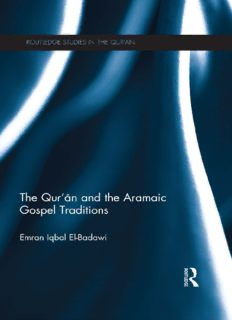
The Qur'an and the Aramaic Gospel Traditions PDF
Preview The Qur'an and the Aramaic Gospel Traditions
The Qur’ān and the Aramaic Gospel Traditions This book is a study of related passages found in the Arabic Qur’ān and the Ara- maic Gospels, that is, the Gospels preserved in the Syriac and Christian Pales- tinian Aramaic dialects. It builds upon the work of traditional Muslim scholars, including al-Biqā‘ī (d. ca. 808/1460) and al-Suyūt.ī (d. 911/1505), who wrote books examining connections between the Qur’ān on the one hand, and Bibli- cal passages and Aramaic terminology on the other, as well as modern western scholars, including Sidney Griffith, who argues that pre-Islamic Arabs accessed the Bible in Aramaic. The Qur’ān and the Aramaic Gospel Traditions examines the history of religious movements in the Middle East from 180 to 632 CE, explaining Islam as a response to the disunity of the Aramaic speaking churches. It then compares the Arabic text of the Qur’ān and the Aramaic text of the Gospels under four main themes: the prophets; the clergy; the divine; and the apocalypse. Among the findings of this book are that the articulator as well as audience of the Qur’ān were monotheistic in origin, probably bilingual, culturally sophisticated, and accustomed to the theo- logical debates that raged between the Aramaic speaking churches. Arguing that the Qur’ān’s teachings and ethics echo Jewish-Christian conserva- tism, this book will be of interest to students and scholars of Religion, History, and Literature. Emran Iqbal El-Badawi is Director and Assistant Professor of Arab Studies at the University of Houston. His articles include “From ‘clergy’ to ‘celibacy’: The development of rahbaniyyah between Qur’ān, Hadith and Church Canon” and “A humanistic reception of the Qur’ān.” His work has been featured in the New York Times, Houston Chronicle and Christian Science Monitor. Routledge Studies in the Qur’ān Series Editor: Andrew Rippin University of Victoria, Canada In its examination of critical issues in the scholarly study of the Qur’ān and its commentaries, this series targets the disciplines of archaeology, history, textual history, anthropology, theology and literary criticism. The contemporary relevance of the Qur’ān in the Muslim world, its role in politics and in legal debates are also dealt with, as are debates surrounding qur’ānic studies in the Muslim world. Literary Structures of Religious Meaning in the Qur’ān Edited by Issa J. Boullata The Development of Exegesis in Early Islam The authenticity of Muslim literature from the formative period Herbert Berg Biblical Prophets in the Qur’ān and Muslim Literature Robert Tottoli Moses in the Qur’ān and Islamic Exegesis Brannon M. Wheeler Logic, Rhetoric and Legal Reasoning in the Qur’ān God’s arguments Rosalind Ward Gwynne Textual Relations in the Qur’ān Relevance, coherence and structure Salwa M. El-Awa S.ūfī Commentaries on the Qur’ān in Classical Islam Kristin Zahra Sands The Qur’an in its Historical Context Gabriel Said Reynolds Interpreting al-Tha‘labī’s Tales of the Prophets Temptation, responsibility and loss Marianna Klar The Qur’an and its Biblical Subtext Gabriel Said Reynolds Qur’anic Hermeneutics Al-Tabrisi and the craft of commentary Bruce Fudge New Perspectives in the Qur’ān The Qur’an in its historical context 2 Edited by Gabriel Said Reynolds The Qur’ān and the Aramaic Gospel Traditions Emran Iqbal El-Badawi Mary in the Qur’an A literary reading Hosn Abboud This page intentionally left blank The Qur’ān and the Aramaic Gospel Traditions Emran Iqbal El-Badawi Routledge Taylor & Francis Group LONDON AND NEW YORK First published 2014 by Routledge 2 Park Square, Milton Park, Abingdon, Oxon OX14 4RN and by Routledge 711 Third Avenue, New York, NY 10017 Routledge is an imprint of the Taylor & Francis Group, an informa business © 2014 Emran Iqbal El-Badawi The right of Emran Iqbal El-Badawi to be identified as author of this work has been asserted by him/her in accordance with sections 77 and 78 of the Copyright, Designs and Patents Act 1988. All rights reserved. No part of this book may be reprinted or reproduced or utilised in any form or by any electronic, mechanical, or other means, now known or hereafter invented, including photocopying and recording, or in any information storage or retrieval system, without permission in writing from the publishers. Trademark notice: Product or corporate names may be trademarks or registered trademarks, and are used only for identification and explanation without intent to infringe. British Library Cataloguing in Publication Data A catalogue record for this book is available from the British Library Library of Congress Cataloging in Publication Data El-Badawi, Emran Iqbal. The Qur’an and the Aramaic gospel traditions / Emran El-Badawi. pages cm — (Routledge studies in the Qur’an) Includes bibliographical references and index. 1. Qur’an—Relation to the Bible. 2. Qur’an—Sources. 3. Qur’an—Criticism, interpretation, etc. 4. Bible. Gospels—Criticism, interpretation, etc. I. Title. BP134.B4E4 2014 297.1’226—dc23 2013024958 ISBN: 978–0–415–82123–0 (hbk) ISBN: 978–1–315–85598–1 (ebk) Typeset in Times New Roman by Swales & Willis Ltd, Exeter, Devon For Rasha ﻲﻨﻘﻧﺎﻌﺗﺫﺇﻲﻜﺒﺗﻡِﺎﺸّﻟﺍﻥُﺫﺂﻣ ﺡُ ﺍﻭﺭﺃ ..ﺭِﺎﺠﺷﻷﺎﻛ ..ﻥِﺫﺂﻤﻠﻟ ﻭ ﺎﻨﻟﺯﺎﻨﻣﻲﻓﻕٌ ﻮﻘﺣﻦِ ﻴﻤﺳﺎﻴﻠﻟ.. ﺡُ ﺎﺗﺮﺗﺚُ ﻴﺣﻮﻔﻐﺗﺖِ ﻴﺒﻟﺍﺔُّﻄﻗﻭ ﺎﻨﺘﻟﻮﻔﻃﻦﻣءٌﺰﺟﻦﱢﺒﻟﺍﺔُﻧﻮﺣﺎﻃ ﺡُ ﺍﻮّﻓﻞِﻴﻬﻟﺍﺮُﻄﻋﻭ ؟ﻰﺴﻧﺃﻒَ ﻴﻜﻓ ﺮٌﻈﺘﻨﻣ .."ﺰﱢﺘﻌﻤﻟﺍﻲﺑﺃ"ﻥُﺎﻜﻣﺍﺬﻫ ﺡُ ﺎﻤﻟﻭﻮٌﻠﺣ "ﺓٍﺰﺋﺎﻓ"ﻪُﺟﻭﻭ ﻲﺘﻐﻟﺎﻨﻫ ...ﻲﺒﻠﻗﺎﻨﻫ ..ﻱﺭﻭﺬﺟ ﺎﻨﻫ ؟ﺡُ ﺎﻀﻳﺇ ﻖِ ﺸﻌﻟﺍ ﻲﻓﻞﻫ؟ﺢُﺿﻭﺃﻒَ ﻴﻜﻓ ﺎﻫﺭَﻭﺎﺳﺃ ﺖﻋﺎﺑﺔٍﻴﻘﺸﻣﺩﻦﻣﻢﻛ ﺡُ ﺎﺘﻔﻣﺮُﻌﺸﻟﺍﻭ ...ﺎﻬﻟﺯﺎﻏﺃ ﻰﺘّﺣ ﺍًﺭﺬﺘﻌﻣﻑِ ﺎﺼﻔﺼﻟﺍ ﺮَﺠﺷﺎﻳﺖُ ﻴﺗﺃ ؟ﺡُ ﺎﺿّ ﻭﻭ.. ءٌﺎﻔﻴﻫﺢُﻣﺎﺴﺗﻞﻬﻓ (ﻲﻧﺎﺒﻗﺭﺍﺰﻧ) This page intentionally left blank Contents List of Figures xi List of Tables xii Preface xiii Acknowledgments xvi Abbreviations xviii Note on Translation xx 1 Sources and Method 1 Introduction 1 Dogmatic Re-Articulation 5 Challenges Posed by the Qur’ān Text 10 Our Sources 30 Methodology and Organization 48 2 Prophetic Tradition in the Late Antique Near East 50 Sectarianism as Prophetic Tradition 50 Assumptions 74 3 Prophets and their Righteous Entourage 78 The Line of Prophets 78 The Righteous Entourage 87 Prophetic Teachings and Ethics 96 4 The Evils of the Clergy 114 Condemnation 114 Temptation 138
Description: